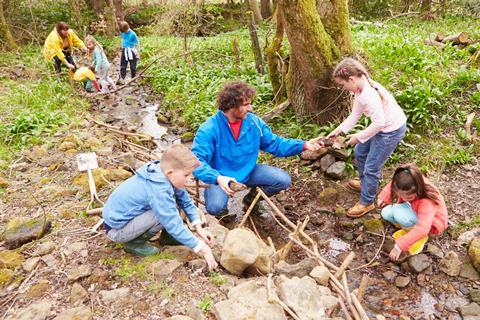New reports published by Natural England are further evidence of the positive impact of taking learning beyond the classroom into natural environments.

Both of them highlight the benefits of high quality learning in natural environments, both on students’ health and learning outcomes.
The Council for Learning Outside the Classroom was commissioned by Natural England, the goverment’s scientific adviser on the natural environment, to create a summary of the reports.
In its analysis, the CLOtC, a charity that champions learning outside the classroom, set out that the evidence proved that getting students into natural environments:
- Has positive social and behavioural outcomes such as self-esteem, resilience, self-confidence and trusting relationships.
- Improves students attainment in reading, mathematics, science, social studies, physical education and drama; and a greater motivation for studying science.
- Offers increased motivation/engagement with learning which can lead to attendance rates going up.
- Increases nature-connectedness and encourages development of pro-environmental behaviours.
- Provides an increase in physical activity, benefiting cardiovascular health.
The first report, titled ‘Links between natural environments, learning and health: evidence briefing’ also found that students from lower income and/or ethnically diverse communities were the most likely to benefit from learning outside the classroom opportunities despite being less likely to have the opportunity to play and learn in natural environments.
For both reports, a ‘natural environment’ is defined as any accessible space that includes natural elements and allows children to play, discover and learn, including within the school grounds, local learning areas and on educational visits.
The second, ‘Social and economic benefits of learning in natural environments’ involved a sample of six primary schools who had already embedded learning outside the classroom into their practice. It found that for every £1 invested into learning in a natural environment, the Social Return on Investment (an assessment of value far reaching than financial return) was £4.23.
Feedback from some of the schools involved:
“Learning outside the classroom in natural environments offers children the opportunity to increase their knowledge of themselves, and their self-awareness. This is followed by an increased sense of responsibility towards others, increased confidence, and high levels of enjoyment and engagement in learning.”
“A positive win-win situation. Children like learning outside as nature is unpredictable, making the children curious as to what they will see, and what they will learn. It is empowering and joyful for all involved.”
Dr Anne Hunt, CEO of the Council for Learning Outside the Classroom, said: “We are delighted to be supporting Natural England to deliver and communicate the results of two new evidence reports.
“Together these reports confirm with no doubt that high quality learning outside the classroom in natural environments can deliver multiple positive health and learning benefits for students, and for staff too.”
“Furthermore, schools that have already embedded learning outside the classroom into their routine teaching practice, such as those who hold the LOtC Mark, demonstrate that it can have a positive social return on investment as well.”
If you want to find out more about the positive impact learning beyond the classroom can have, join the Council for Learning Outside the Classroom for a day of informative workshops, networking and inspiring speakers at its National Conference in March.
Discounted tickets available until 31st December. Click this link for all the information and to book your place.










